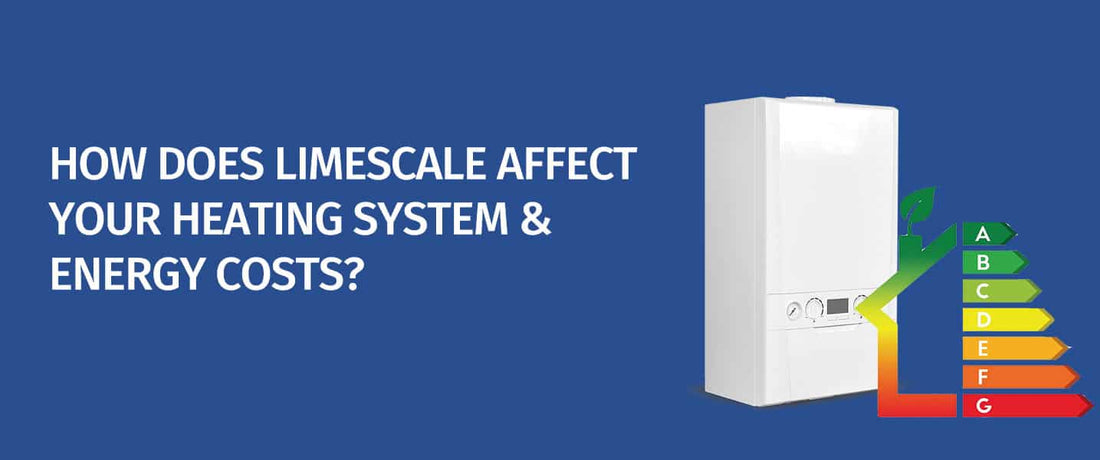Limescale is a common problem in Ireland. Inside a kettle is the most obvious place to spot limescale deposits, but it also builds up in places you can’t see. Left unchecked, it can become an expensive problem leading to decreased water pressure, flow rates and an increased energy demand; in turn, leading to higher energy bills and maintenance costs.
With the soaring fuel & energy prices, it is critical to make energy-efficient choices to save money.
In this blog, we discover the impact of limescale on your heating appliances and energy costs.
What causes limescale?
Limescale is a white substance mainly made up of calcium and magnesium which is left behind when hard water evaporates. It produces a hard, chalky deposit and builds up where hard water is heated or left standing.
Now, what is hard water you might ask?
Hard water is water containing an excessive amount of minerals such as calcium and magnesium. It’s a natural result of minerals accumulating during the water cycle, and it can happen with well water and even city water. The more calcium and magnesium dissolved in the water, the harder the water becomes.
The build-up is particularly susceptible to hot water appliances because hot water evaporates off a surface much quicker than cold water would. When heated, the calcium content of the water becomes increasingly concentrated, resulting in the build-up of limescale. This means if you are
living in a hard water area, your tap, washing machines, dishwashers, showers, kettles and boilers can all be affected by limescale.
Effects of limescale on your heating systems

Hard water not just impacts your everyday appliances, it can create problems for your boilers & heating systems. Leftover minerals in hard water may build up over time and lead to reduced efficiency, frequent repairs, and a shorter lifespan of heating systems.
Let’s take a look at hard water problems specific to boilers and heating systems:
A build-up of limescale on this particular part will cause problems by reducing how much heat it can emit.
If a coating of limescale builds up in pipes it affects how much hot water or gas can pass through. This can negatively impact how effective your heating system is. It can also cause a boiler to work harder and less efficiently, by struggling to maintain a consistent level of heat.
Limescale buildup can cause circulation problems within the radiator preventing hot water from moving around the system. As a result, the radiator might develop cold spots and take a long time to warm up.
In typical gas-powered water heaters, the water that’s stored in the water heater’s tank is heated from the bottom by a set of burners. If your home has hard water, hardness minerals can solidify in the form of limescale and build up on the bottom of your water heater’s tank. This forms a layer between your water heater’s burners and the water inside the tank, making it much more difficult for your water heater to keep your home’s hot water at the right temperature.
If you have an electric water heater, limescale can cause similar problems by building up on your water heater’s heating elements and reducing their effectiveness.
Effects of limescale on your energy bills
Limescale in a home can add hundreds of euros per year to the energy bill. With the rising fuel & energy costs, this is definitely concerning for most households.
Limescale creates an insulating layer on the heating element inhibiting heat transfer and hence decreasing the efficiency of the unit. In simple terms, you pay to heat the thick build-up of limescale before you start to heat your water.
Limescale builds in hard water conditions at a rate of about 1mm a year. According to British Water, the trade association for the UK water industry, hard water used by a family of four accumulates some 70kg of limescale in those 12 months.

Just 1.6mm of limescale build-up can cause a 12% drop in heat transfer efficiency, meaning that equipment has to work harder to heat water. Working harder will cut short the lifespan of your boiler and on average will cost you around €1,500 - €2,500 to replace, not to mention the inconvenience of possible breakdowns during the coldest months.
One Simple Solution
Ways to increase the energy efficiency of heating and hot water generation have been available for some time. A simple solution to remove the limescale and prevent it from coming back is by installing a
water softener at the mains point of entry. Not only does it prevent lime build-up in boilers & pipework but it would also remove existing limescale built up over the years.
Over time, this will improve the efficiency and lifespan of all your water-using appliances. This is the reason why most
new builds in Ireland are using a water softener to protect their air source heat pumps to achieve significant cost savings. With a CWS water softener, an average Irish household can save around €600 every year using soft water.
If you have building a new house or struggling with limescale in your house, the best way forward is to treat limescale at the source.
Talk to our team of experts for more information.
 Hard water not just impacts your everyday appliances, it can create problems for your boilers & heating systems. Leftover minerals in hard water may build up over time and lead to reduced efficiency, frequent repairs, and a shorter lifespan of heating systems.
Let’s take a look at hard water problems specific to boilers and heating systems:
Hard water not just impacts your everyday appliances, it can create problems for your boilers & heating systems. Leftover minerals in hard water may build up over time and lead to reduced efficiency, frequent repairs, and a shorter lifespan of heating systems.
Let’s take a look at hard water problems specific to boilers and heating systems:
 Just 1.6mm of limescale build-up can cause a 12% drop in heat transfer efficiency, meaning that equipment has to work harder to heat water. Working harder will cut short the lifespan of your boiler and on average will cost you around €1,500 - €2,500 to replace, not to mention the inconvenience of possible breakdowns during the coldest months.
Just 1.6mm of limescale build-up can cause a 12% drop in heat transfer efficiency, meaning that equipment has to work harder to heat water. Working harder will cut short the lifespan of your boiler and on average will cost you around €1,500 - €2,500 to replace, not to mention the inconvenience of possible breakdowns during the coldest months.

